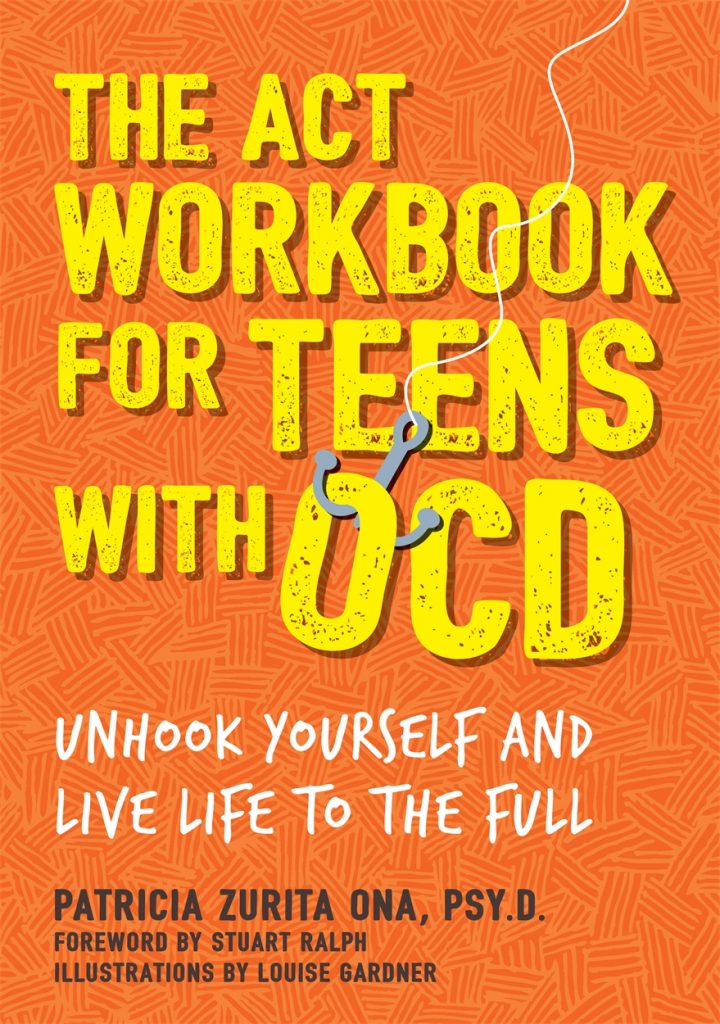
Can you briefly outline your history working with children and teens?
My undergrad was in school psychology; I graduated in 1995 from the Catholic University in Bolivia and there, I worked with children, teens, and families, primarily in school settings. I worked frequently with presenting problems like OCD, neurodiversity, and all forms of anxiety. When I moved to the states in 2001, I continued my work with a wide range of patients dealing with anxiety, OCD, trauma, and emotion regulation, and focused my clinical work with adults. In 2007 when I graduated with my Psy.D. in clinical psychology, I started building a practice working with children, adults, teens, and families. Over the years, I worked significantly with teens with anxiety, whether it was school test anxiety, separation anxiety, and any other forms of anxiety.
What can teachers, school psychologists, and other educators learn from The ACT Workbook for Teens with OCD?
The first thing would be that OCD is treatable and we have many research-based interventions that have shown to be effective. Secondly and perhaps most importantly, for any student or teen to make the best of treatment, they need to be involved in treatment from the beginning to the end, and they will respond much better if they make a personal choice to engage with their treatment. Sometimes, adults forget to include teens in their own treatment. Thirdly, they will learn the direct application of Acceptance and Commitment Therapy (ACT) and Exposure Response Prevention (ERP) for OCD.
I ultimately wrote this book for teens. It is approachable, has teen-friendly illustrations, and provides the teens with multiple exercises to face their fears related to obsessions and related struggles. The most important thing for them to understand is that they have a choice in how they respond, what I call “the choice point.” The choice point invites teens to assess, map, and decide how to approach every single exposure exercise. It’s like teens and all readers use the choice point to decide how to approach a particular exposure exercise.
How can The ACT Workbook for Teens with OCD be used in a classroom or other school setting?

I just got an email last week from a psychologist in Texas and she mentioned she is using the workbook in a group setting, which is beautiful.
When I think about how to use the workbook in a group setting, schools, hospitals, or non-profit organizations, I think the earlier sections of it could be taught as one teaching point a week in a class, if we are thinking about curriculum. For sections 6 and 8 (values exploration and skills to handle obsessions), I would spend more time because those teaching points would likely require more time as there is a lot to understand and internalize.
I think this book lends itself well to a sequential curriculum; it can be broken down to one session per week or it can be adjusted to be a ten or twelve week course. I think, in general, there is a lot of flexibility with how teachers and counselors can use it, both with individuals and small groups.
In the past couple years, mental health has become a hot button issue for many who work in the school system. What are steps teachers, school psychologists, administrators, and other educators can take to support the mental health of their students?
It is super key to inform the public and educate them about what OCD is and what it’s not.
In particular with OCD, it is incredibly important to provide education about what OCD is and deconstruct the idea that OCD is not just about organizing or arranging objects. OCD can involve obsessions about making mistakes, metaphysical matter themes, aggressive, sexual, or contamination themes— OCD is beyond “being tidy.” Individuals with OCD can become anxious about anything—religion, the environment, relationships, activities—ranging from the mundane to bizarre topics.
Because of this lack of understanding, OCD often goes undiagnosed. While people with anxiety or panic attacks typically get diagnosed within 1-2 years, people with OCD often go 8-10 years without being diagnosed. It is super key to inform the public and educate them about what OCD is and what it’s not.
Furthermore, there is so much secrecy with mental health problems and so much emphasis on the idea that people should “power through them.” So, talking about mental health problems and normalizing them will facilitate people to get access to effective treatments. While past literature has be focused on a “cure” for anxiety or other mental health issues, conversations and future literature need to emphasize that message that having anxiety is not the problem, anxiety happens, but how we respond to anxiety, that’s the key variable to create a fulfilling, and rich life
What inspired The ACT Workbook for Teens with OCD?
Maybe seven years ago, I had a wonderful family with an 11 or 12-year-old teenager. His parents were frustrated because they felt they had tried everything they could to help their kid with OCD. He had gone to multiple therapists, but after a few weeks of sessions, he would stop being invested.
When I talked to this teenager, he said, “They think it’s so easy for me to face my fears. My parents and therapists always just tell me what to do, like it’s so easy, but it’s not.” This conversation proved to be a catalyst for me to start thinking about how to deliver exposure-based treatments in a more approachable and teen-friendly way, so teens can be engaged on treatment, to the best they can.
I wanted to create something that builds on teens’ and kids’ capacity to make choices, a treatment that gives them the power to make choices about how and when to engage with their therapy. If we think about this, adolescence is a time in which teens don’t like to be told what to think, what to do, or how to live their lives; a treatment and workbook that takes in consideration where they are, developmentally speaking, is more conducive for them to stay in treatment in make the best of it.
For more information: www.thisisdoctorz.com